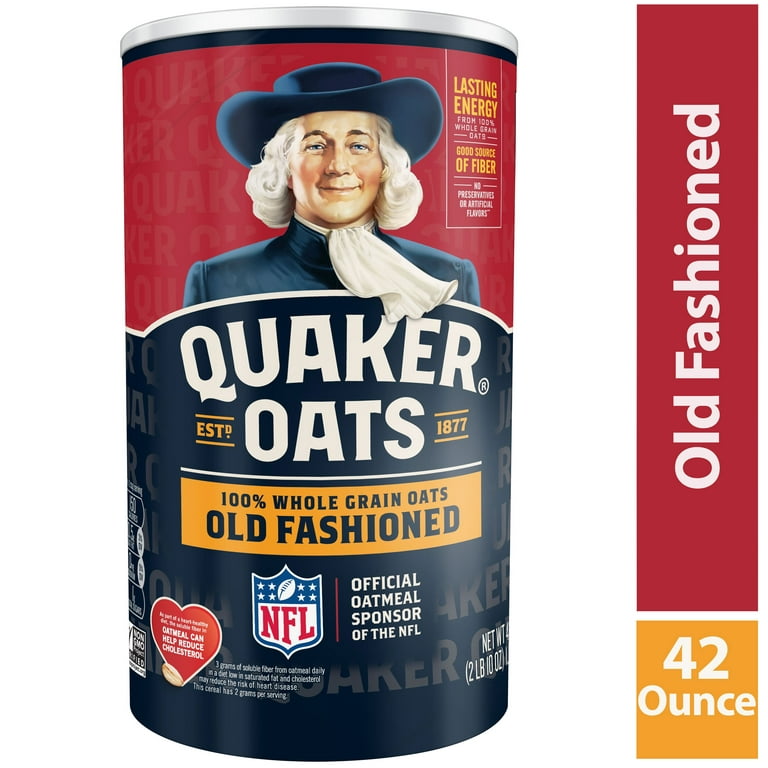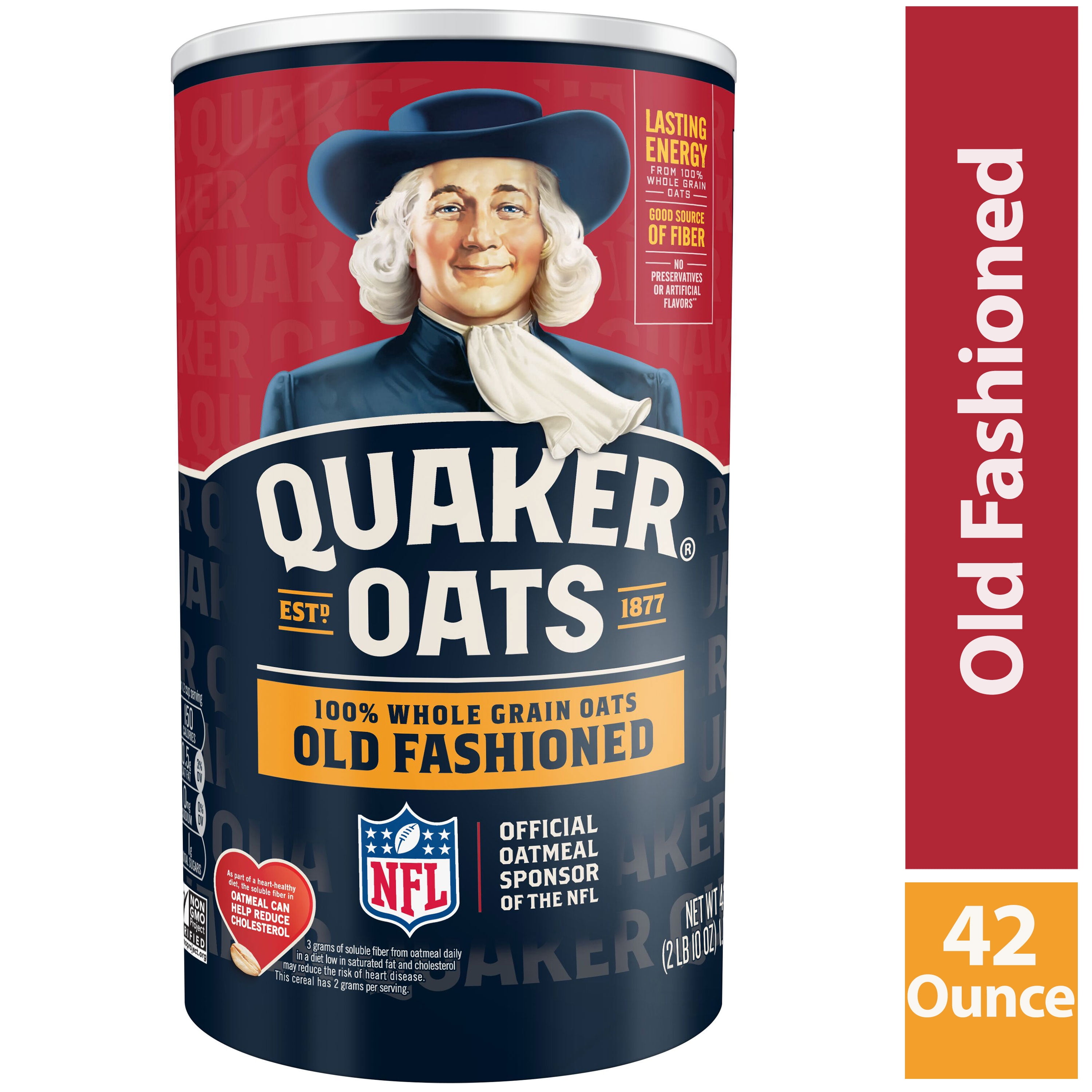Old Fashioned Quaker Oats are not certified gluten-free. They may contain trace amounts of gluten due to cross-contamination.
Quaker Oats are a popular breakfast staple. Many people enjoy them for their versatility and nutritional benefits. Oats themselves are naturally gluten-free. However, cross-contamination can occur during processing and packaging. Facilities that process oats often handle wheat, barley, and rye.
These grains contain gluten, which can affect those with celiac disease or gluten sensitivity. Quaker does offer a gluten-free line, but Old Fashioned Quaker Oats are not part of it. Always check labels for gluten-free certification if you need to avoid gluten. This ensures you make the best choice for your dietary needs and health.
What Are Quaker Oats?
Quaker Oats are a popular type of oatmeal. They are made from whole grains. These oats are known for their high nutritional value. Many people enjoy Quaker Oats for breakfast. They are easy to prepare and delicious. Let’s explore more about Quaker Oats.
History Of Quaker Oats
Quaker Oats has a rich history. The brand started in 1877. It was one of the first brands to register as a trademark. The company began in Ravenna, Ohio. Its name comes from the Quaker faith. The logo features a man in Quaker clothing. The Quaker Oats company grew quickly. By 1901, it was a leading oatmeal brand.
During World War II, Quaker Oats played a big role. They provided oats to soldiers. Their products became a household staple. Over the years, Quaker Oats added new products. They introduced instant oats and flavored varieties. Today, Quaker Oats is a global brand.
Types Of Quaker Oats
Quaker Oats offers various types of oats. Each type has unique features. Here are the main types:
- Old Fashioned Quaker Oats: These are whole rolled oats. They take longer to cook but have a chewy texture.
- Quick Quaker Oats: These oats are rolled thinner. They cook faster and are softer.
- Instant Quaker Oats: These are pre-cooked oats. They cook instantly with hot water.
- Steel Cut Oats: These oats are cut into pieces. They have a nutty flavor and take longer to cook.
- Gluten-Free Quaker Oats: These are specially processed. They are safe for people with gluten intolerance.
Quaker Oats also offers flavored options. These include maple, brown sugar, and apple cinnamon. They make breakfast tasty and convenient.
| Type of Oats | Cooking Time | Texture |
|---|---|---|
| Old Fashioned Quaker Oats | 5 minutes | Chewy |
| Quick Quaker Oats | 1 minute | Softer |
| Instant Quaker Oats | Instant | Soft |
| Steel Cut Oats | 25-30 minutes | Nutty |
| Gluten-Free Quaker Oats | Varies | Varies |

Understanding Gluten
Many people talk about gluten. It can be confusing. Gluten is a protein. It is found in many foods. Knowing about gluten is important. It helps you make good food choices.
What Is Gluten?
Gluten is a group of proteins. These proteins are in wheat, barley, and rye. They help food keep its shape. Gluten acts like a glue. It holds food together. Some people cannot eat gluten. It can make them sick.
Common Sources Of Gluten
Gluten is in many foods. Here are some common sources:
- Wheat – Bread, pasta, and cereals
- Barley – Beer, soups, and malt products
- Rye – Rye bread, rye beer, and some cereals
- Triticale – A hybrid of wheat and rye
Gluten can also hide in other products. Sometimes it is in sauces and dressings. Some processed foods have gluten too. Always check food labels. Look for gluten-free labels if you need to avoid gluten.
Are Quaker Oats Naturally Gluten-free?
Many people are curious about the gluten content in Quaker Oats. Are these oats naturally gluten-free, or is there a risk of contamination? Let’s dive into the facts.
Oats And Gluten
Oats are naturally gluten-free. They do not contain wheat, barley, or rye, the grains with gluten. This makes oats a great choice for many gluten-sensitive individuals.
Cross-contamination Risks
Although oats are naturally gluten-free, they can be contaminated. This contamination happens during growing, harvesting, or processing. Quaker Oats are no exception.
Quaker Oats are often processed in facilities that handle gluten grains. This increases the risk of cross-contamination. Therefore, Quaker Oats cannot guarantee they are 100% gluten-free.
| Factor | Risk Level |
|---|---|
| Growing | Moderate |
| Harvesting | High |
| Processing | Very High |
- Growing: Oats may be grown near gluten grains.
- Harvesting: Shared equipment can cause contamination.
- Processing: Facilities may handle multiple grains.
For those with severe gluten intolerance, certified gluten-free oats are the safest option. These oats are processed in gluten-free facilities.
Quaker’s Production Process
Many people wonder if Old Fashioned Quaker Oats are gluten-free. It’s important to understand Quaker’s production process. This ensures the oats are safe for those avoiding gluten.
Manufacturing Practices
Quaker has strict manufacturing practices to maintain product quality. They use dedicated facilities to avoid cross-contamination. Here’s a breakdown of their practices:
- Dedicated gluten-free processing lines
- Regular cleaning of equipment
- Staff training on gluten-free protocols
These practices help to ensure the oats remain gluten-free. Quaker also tests the products regularly.
Gluten-free Certification
Quaker takes extra steps to achieve gluten-free certification. This involves third-party testing. Here’s what you need to know:
- Products are tested for gluten levels
- Certification by recognized gluten-free organizations
- Continuous monitoring and auditing
This certification assures that the oats meet strict gluten-free standards. Look for the gluten-free label on the packaging for reassurance.
Consumer Experiences
Quaker Oats have been a breakfast staple for many years. But are Old Fashioned Quaker Oats gluten-free? We delve into the consumer experiences to find out more.
Reviews And Testimonials
Many consumers share their experiences online. Some praise Old Fashioned Quaker Oats for their taste and texture. Here are some reviews and testimonials:
- Jane D.: “I love the texture of these oats. They are hearty and filling.”
- Mike P.: “These oats cook perfectly every time. My family loves them.”
- Susan L.: “I’ve been eating these oats for years. They are my go-to breakfast.”
These positive reviews highlight the popularity and satisfaction among consumers.
Common Concerns
Some consumers have concerns about gluten content. It’s important to address these concerns:
| Concern | Explanation |
|---|---|
| Cross-Contamination | Some worry about oats being processed with gluten-containing grains. |
| Labeling | Consumers look for clear “gluten-free” labels on packaging. |
| Health Reactions | Some people experience symptoms even with gluten-free oats. |
These concerns are valid, especially for those with gluten sensitivity. It’s crucial to read labels carefully and consult with a healthcare provider.

Alternatives To Quaker Oats
If you’re seeking alternatives to Quaker Oats, you’re not alone. Many people need gluten-free options due to dietary restrictions. Luckily, there are plenty of choices available. Let’s explore some top alternatives.
Certified Gluten-free Oats
Some oats are specially processed to be gluten-free. These oats are tested to ensure they meet strict standards. Here are some brands offering certified gluten-free oats:
- Bob’s Red Mill: They have a wide variety of gluten-free oats.
- GF Harvest: Known for their purity protocol oats.
- Purely Elizabeth: Offers gluten-free oatmeal packets.
Other Gluten-free Options
Beyond oats, many other grains are naturally gluten-free. These can easily replace oats in your diet. Here are some popular choices:
| Grain | Benefits |
|---|---|
| Quinoa | High in protein and fiber. |
| Chia Seeds | Rich in omega-3 fatty acids. |
| Buckwheat | Contains antioxidants and magnesium. |
These alternatives are not only gluten-free but also nutritious. They provide a variety of health benefits. Always check the packaging for certification.
Final Thoughts
Understanding whether Old Fashioned Quaker Oats are gluten-free is important. People with celiac disease or gluten sensitivity need to be cautious. Here, we summarize our findings and offer recommendations for a gluten-free diet.
Summary Of Findings
Old Fashioned Quaker Oats are naturally gluten-free. Yet, cross-contamination can happen during processing. This contamination makes them unsafe for those with gluten intolerance.
| Aspect | Details |
|---|---|
| Source | Oats themselves are gluten-free |
| Processing | Risk of cross-contamination with wheat, barley, or rye |
| Labeling | Look for gluten-free certification |
Recommendations For Gluten-free Diets
Choose oats that have a gluten-free certification. This reduces the risk of cross-contamination. Several brands offer certified gluten-free oats. Check the label carefully before buying.
- Buy certified gluten-free oats.
- Read labels to ensure no cross-contamination.
- Consult a healthcare provider for personalized advice.
Eating a gluten-free diet can be challenging. Follow these tips to stay safe and healthy. Enjoy your meals with peace of mind.

Frequently Asked Questions
Are Quaker Oats Gluten-free?
Quaker Oats are not certified gluten-free. They may contain trace amounts of gluten due to cross-contamination.
Can Celiacs Eat Quaker Oats?
People with celiac disease should avoid Quaker Oats. Cross-contamination with gluten can pose health risks for them.
Do Old Fashioned Quaker Oats Contain Gluten?
Old Fashioned Quaker Oats may contain gluten. They are processed in facilities that handle wheat.
How To Identify Gluten-free Oats?
Look for oats labeled as “gluten-free. ” These are processed in dedicated gluten-free facilities.
Conclusion
Choosing gluten-free options is crucial for those with gluten sensitivities. Old Fashioned Quaker Oats may not be entirely gluten-free. Always check labels and consult manufacturers. Staying informed helps maintain a gluten-free diet. Ensure your health by selecting products that meet your dietary needs.
Stay vigilant for a healthier lifestyle.